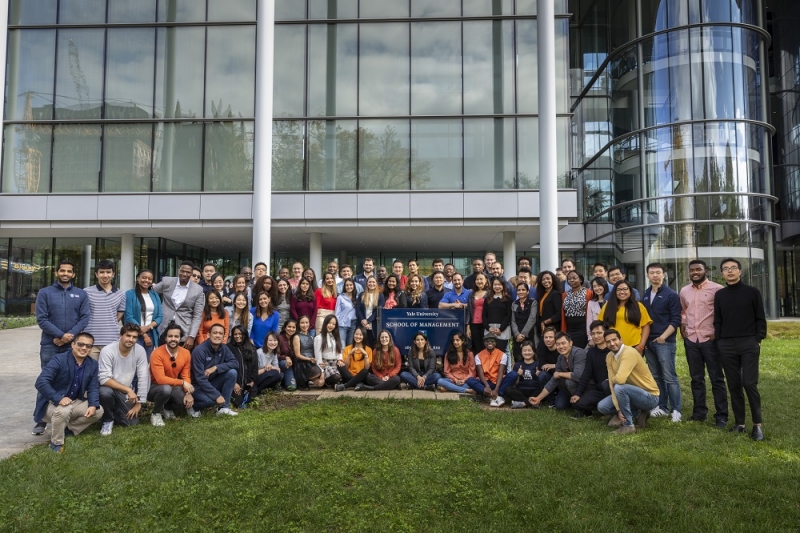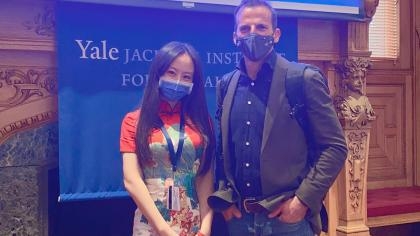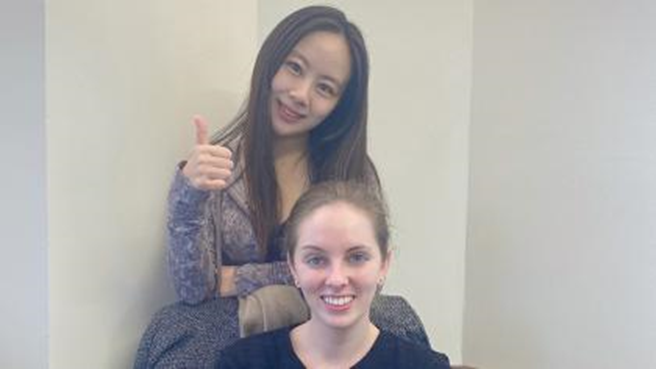Becoming My Whole Intellectual Self through the MAM Program
- Hua Yuting, Class of Renmin IMBA 2021 & Yale MAM 2022
- 2022-03-10
The blog was originally published here: https://som.yale.edu/story/2022/becoming-my-whole-intellectual-self-through-mam-program.
When I applied to the Master of Advanced Management program at the Yale School of Management 22 months ago, I knew that SOM had abundant resources both in and out of the classroom. Nearly two years later, I can say that SOM has been the best place for me to acquire a more holistic world view, to develop new perspectives, and to continue honing my passions. Not only have I been able to design a schedule based on my own career goals and interests, but I have also had the opportunity to develop my whole self, intellectually—this is what I appreciate most about Yale.
I came to SOM with an MBA from Renmin University of China and a background in strategic branding and public relations. I wanted not only to develop more business know-how, but also to explore in a more expansive way how human beings make decisions or select their ways of living. As an MAM student at Yale, I was able to take any courses I desired in addition to the two core courses. MAM students can choose to explore topics broadly, or we can concentrate deeply on one specific area.

With members of the MAM Class of 2022
Back in July and August, when I started to select our courses, I was amazed by the possibilities and opportunities at Yale. Although my goal is to pursue a career as a leader in business, I also have interests in art, literature, and history, and I knew that this might be my last chance to explore those interests in school. I sat in front of my computer, browsing through Yale’s course library and checking the syllabi one by one for a whole day. I felt like I was opening the door to the world. Apart from courses within my own School of Management—courses in finance, entrepreneurship, or leadership—there was something more significant: here, I could go to the Yale Law School, which has trained many American presidents; here, I could learn my third, even fourth language; here, even without any artistic background, I could go to the David Geffen School of Drama or the School of Art to discuss film art and photography techniques; here, I could discuss the origin of religion with professors from the Divinity School. In the Graduate School of Arts & Sciences, which I was most interested in, there are countless courses on literature and art, from “Literature and Philosophy from Locke to Kant” to solid science courses like “Quantitative Biochemical Imaging” or “Computational Chemistry.” I wish I had more hours each day so I could have taken them all!
Finally, in addition to the SOM courses, I selected “Elementary and Intermediate French I,” not only because of my long-standing interest in France, but also because of French in Action, a prominent language-learning program created by late Professor Pierre Capretz at Yale. I also selected a course called “Introduction to Special Operations,” which was offered by the Jackson Institute for Global Affairs, because I wanted to explore a side of American politics and the U.S. military that is lesser known to the public. “The Information Society” at the law school, which discussed social media, was another course I chose, since my previous career was closely related to this field. In addition, I audited an undergraduate course named “China from Present to Past” to get a different perspective on my home country.
And so began my unique and wonderful academic journey.
 In Professor Christopher Fussell’(pictured left) s “Introduction to Special Operations,” we looked specifically at the historic uses of these forces and at the post-9/11 expansion of their authority, funding, and mission sets. The course also considered what their proper role and function may look like moving forward. We gained a foundational understanding of a relatively small component of the U.S. military with an outsized strategic position on the global stage. In each class, after introducing the topic of the week, the professor would ask, “If you were the senior manager, what would you do?” Questions like this were constantly brought up to cultivate our deep-thinking ability and leadership. Rather than standard answers, Prof. Fussell always wanted to hear unique viewpoints, especially those they as Americans had never considered before. Everyone was required to “make contributions to the class based on their own experience.” Every minute of the class served a purpose. Sometimes we had guest speakers who work in the military, while at other times we delivered presentations based on thorough research and learned from each other. We even ran through an in-person briefing scenario featuring real special operation forces leaders, which required us to imagine ourselves as future senior leaders in the national security space and forced us to cultivate key factors, framework, and decision-making capability in a real case. From this course, I not only learned the basic military structure of how special forces operate, but more important, I trained myself in making a logical judgment in a leadership position.
In Professor Christopher Fussell’(pictured left) s “Introduction to Special Operations,” we looked specifically at the historic uses of these forces and at the post-9/11 expansion of their authority, funding, and mission sets. The course also considered what their proper role and function may look like moving forward. We gained a foundational understanding of a relatively small component of the U.S. military with an outsized strategic position on the global stage. In each class, after introducing the topic of the week, the professor would ask, “If you were the senior manager, what would you do?” Questions like this were constantly brought up to cultivate our deep-thinking ability and leadership. Rather than standard answers, Prof. Fussell always wanted to hear unique viewpoints, especially those they as Americans had never considered before. Everyone was required to “make contributions to the class based on their own experience.” Every minute of the class served a purpose. Sometimes we had guest speakers who work in the military, while at other times we delivered presentations based on thorough research and learned from each other. We even ran through an in-person briefing scenario featuring real special operation forces leaders, which required us to imagine ourselves as future senior leaders in the national security space and forced us to cultivate key factors, framework, and decision-making capability in a real case. From this course, I not only learned the basic military structure of how special forces operate, but more important, I trained myself in making a logical judgment in a leadership position.
Taking a French course was one of my biggest drea ms when I came to Yale. The particular course I took is one of the best and most popular language courses for its intensive and immersive nature. By the second class, it was conducted completely in French. We could ask questions in English, but the teacher only answered in French. As the teacher (Professor Louise Moulin pictured right) repeated to us, “French is French,” encouraging us to steep ourselves in the new language rather than constantly resorting to English. Louise Moulin, my French teacher, was helpful, patient, and kind. She tried different ways to improve our interest in French and shared with us a lot of effective methods to master a new language. I also learned from my classmates and native French speakers in the MAM program.
ms when I came to Yale. The particular course I took is one of the best and most popular language courses for its intensive and immersive nature. By the second class, it was conducted completely in French. We could ask questions in English, but the teacher only answered in French. As the teacher (Professor Louise Moulin pictured right) repeated to us, “French is French,” encouraging us to steep ourselves in the new language rather than constantly resorting to English. Louise Moulin, my French teacher, was helpful, patient, and kind. She tried different ways to improve our interest in French and shared with us a lot of effective methods to master a new language. I also learned from my classmates and native French speakers in the MAM program.
I had been a bit skeptical about what I could actually learn in one semester, and the result was amazingly rewarding. As a Chinese student who had barely known French, not only did I take the French A2 DELF test in New York, but I was also able to get an honors grade in the language at Yale. Although I still cannot speak fluently with my French-speaking classmates, I can understand some basic chats with them and express my thoughts in a clear manner. This is a totally unimaginable achievement for me.
Professor Valerie Hansen’s “China from Present to Past,” which I audited, is very popular among undergraduate students. This course starts from the contemporary period, then goes back to the Song Dynasty around 1000 AD. In this course, I became reacquainted with my motherland. As a historian and author, Prof. Hansen enlightened us about economic development, lives of ordinary people, genders, disputes, etc. More important, she asked us to think more deeply. For example, she often required us not to think linearly but in terms of comparisons—like how the organization of salt wells in the Qing Dynasty differed from that of contemporaneous European and American companies. In addition, she also encouraged us to foster leadership by asking questions, such as what we would do if we were the king in ancient times.
All these courses outside of SOM were different from anything I experienced before, and are of great value to me. In each course I took, I was astonished by the diversity of people, backgrounds, and thoughts. The most important thing I have gained from them is the permission, even encouragement, to think independently. I’ve learned to engage in new ways of seeing the world, and new systems of measuring values and thoughts. I’ve been encouraged to be open to other viewpoints, yet still making decisions on my own.
Thanks, Yale SOM MAM, for giving me this flexibility to utilize Yale’s resources, broaden my intellectual horizons, explore new sides of myself, communicate with different people, and pursue my passions. I have been, and will always be, thrilled to be part of this amazing community that will impact me for life. I look forward to becoming a true future leader capable of tackling challenges with innovation and accomplishing goals in spite of whatever obstruction lies ahead.



